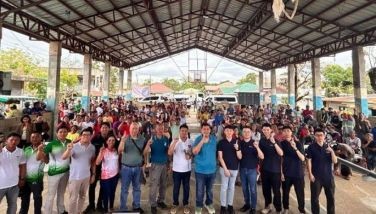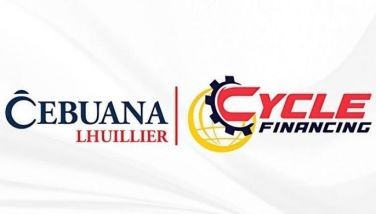It’s complicated!

There are good reasons to think that our country’s economic situation is still good. Most analysts say it is possible to meet our GDP target growth for the year, or very close to it. But the real state of our economy is a bit complicated.
Inflation is still expected to peak in the third quarter, but we may be back to usual by next year. If you believe Duterte’s economic managers, we are just passing through a temporary rough patch.
The money managers of Citibank seem to feel the same way, at least publicly. When they conducted the regular briefing of their prime Citigold clients, they tried hard to sound bullish on the country’s economy.
They think growth can be sustained by a consumer sector that they expect to remain strong, despite growing threats of inflation, a potential decline in remittances and the slow rollout of Build Build Build. They didn’t even discuss the elephant in the room – political risk – that could disrupt our economy’s growth momentum.
One risk they acknowledged is external – the danger that Donald Trump’s trade war will have negative repercussions on ASEAN economies that are closely tied up with China’s supply chain. But not the Philippines.
An in-depth analysis by a unit of the Financial Times observed that even if “the Asean 5 have not been hit as hard as Turkey or Argentina, equities in all five countries have sold off sharply, with only Vietnam holding on to many of last year’s gains.”
The same FT report noted that “the Philippine peso has been the worst performer among the Asean 5 currencies, shedding more than 7.3 percent year-to-date against the dollar, followed by the Indonesian rupiah at 6.1 percent.”
While the trade war has affected us and Indonesia the least, the FT pointed out that our persistent current account deficits make the Philippines and Indonesia “more susceptible to currency depreciation and – in extreme scenarios – balance of payments crises. For now, their import cover is sufficient, with foreign exchange reserves equal to 8.8 months of imports for the Philippines and 8.1 for Indonesia.”
But, the FT warns: “The situation in the Philippines is the more precarious. As FTCR analysis has shown, the economy is being squeezed by a deteriorating trade balance and decelerating remittance growth. The country has run a current account deficit since late 2016, reducing foreign currency reserves by 10.7 percent from their September 2016 peak.
“Worse, the trend is accelerating. Almost half of the country’s reserve losses have come in the past six months, a pace that could become unsustainable if external conditions worsen. The Philippines also has the Asean 5’s highest dependency on dollar-denominated energy imports, so a weaker peso is running up its import bill.
“Inflation compounds such challenges. The consumer price index for the Philippines’ has increased every month so far this year because of rising oil prices and a rice shortage, increasing to 5.7 percent in June from 3.3 percent in 2017.”
Moody’s, the credit rating agency, has affirmed the Philippines’ Baa2 rating and maintained the outlook at stable. That means our obligations are subject to moderate credit risk and are considered medium grade and may possess certain speculative characteristics.
Moody’s also flags a potential shift to federalism as “downside risk” to our fiscal health.
Moody’s expects “growth will remain robust and that the Philippines’ fiscal metrics will strengthen somewhat as the government continues to make progress on its socioeconomic reform agenda, but these trends are likely to fall short of bringing the Philippines’ credit profile in line with higher-rated countries.”
Moody’s noted the challenges our policymakers face in managing the current inflationary pressures. It also warned that “domestic political developments and prospective changes to governance frameworks, including a shift to a federal form of government, present downside risks to the country’s institutional and fiscal profile.”
Moody’s echoed fears expressed by eminent Filipino economists that the shift to federalism would likely bloat the aggregate size of the government bureaucracy and, hence, public expenditure.
More importantly, Moody’s pointed out “there may be a gap between the national and local levels of government with respect to their ability to manage fiscal resources, posing a risk to the improved fiscal discipline that has characterized national government finances over the past decade.”
Fitch, another rating agency, also maintained its positive rating for the country. But it expressed belief “the economy faces some overheating risks, evident from a recent rise in inflation, rapid credit growth and a widening trade deficit, although steps taken by the BSP to tighten monetary policy may contain these risks.”
Indeed, when you talk to financial analysts in private, they express worry about our country’s political risk. It isn’t just the unpredictability by which they see Duterte, but also the impact of growing sharp divisions in society that could breed instability.
As expected, Finance Secretary Sonny Dominguez minimizes these concerns. He urged credit watchdog Moody’s not to be distracted by the political noise generated by the chief executive.
“If you talk about the political noise, yes, there is. It’s inevitable for someone who’s shaking up the tree. It’s inevitable because of the personality of the President, and people are not used to this type of governance,” Dominguez told officials of Moody’s in a meeting.
Other than the danger of political risk, Moody’s tend to agree with Dominguez. In its report on the Philippines, it said: “The credit strengths (of the Philippines) include a relatively large economy and high growth potential that support the economy’s capacity to absorb shocks.”
So you see, the state of our economy today can only be described as complicated. There are negative trends that must be managed to prevent a crisis. We can weather the storm if we want to, but we must be careful with the disruptive political games we play.
Boo Chanco’s e-mail address is bchanco@gmail.com. Follow him on Twitter @boochanco.
- Latest
- Trending



























